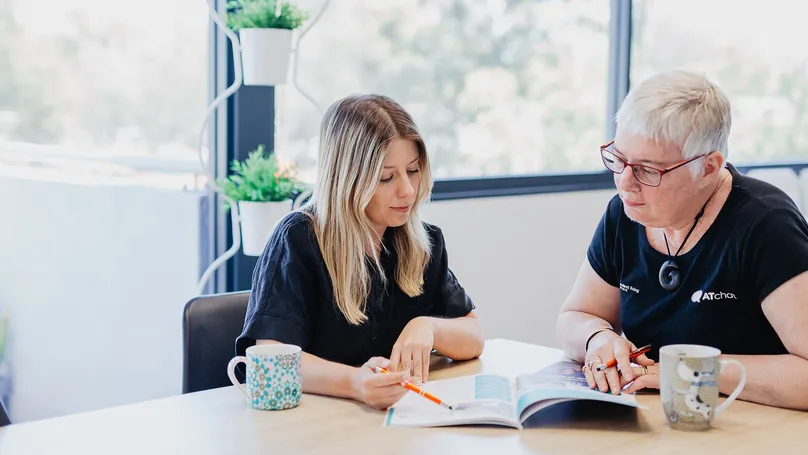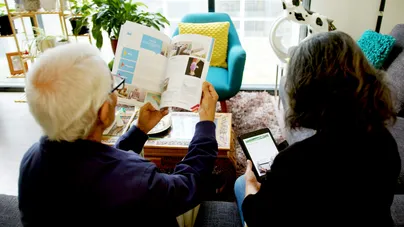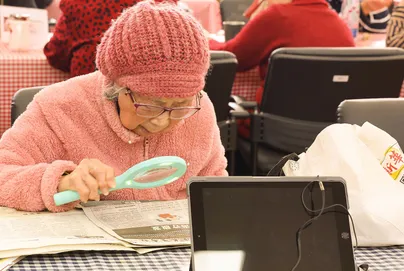Here are some healthy choices you can make to keep your thinking skills strong as you age.

This article was reviewed by experts from the Centre for Healthy Brain Ageing (CHeBA).
Ageing of the brain is not an inevitable decline – it is a journey we can influence through prevention and care. A physically, mentally, and socially active lifestyle is the key, when combined with looking after your heart health.
– CHeBA Co-Directors Scientia Professor Perminder Sachdev AM and Scientia Professor Henry Brodaty AO
What is cognitive health?
Cognitive health refers to your ability to think, learn, and remember.
This includes your ability to:
- Use your language skills
- Concentrate on something
- Plan things, make decisions, and solve problems
You use these skills every day to live well and engage with other people.
These thinking skills are an important part of your overall brain health.
What is brain health?
Your brain health refers to all your brain’s functions.
For reference, some other functions of your brain include:
- Your motor skills
- Your emotional regulation
- Your perception of and response to sensory information
Keeping a healthy brain helps you stay happy and independent as you age.
You can take charge of your brain health
As you age, it’s normal to experience changes to your brain and physical health. Some good news is that you can do a lot to take charge of these changes.
To do so, you need to treat all aspects of your health together. This is because your body, brain, and mind are all connected to each other. Each needs the others to thrive.
If you’re interested in boosting your brain and cognitive health, you need to also take care of:
- Your heart health
- Your physical health and fitness
- Your mental health and stress levels
This article will discuss some of the healthy lifestyle choices you can make to maintain and even improve your thinking skills.
Your brain and heart are linked
Your brain is the source of your thoughts. You need it to be healthy for optimal thinking power.
One important way to look after your brain is to protect your head. For example, wear your helmet when you ride a bike, use your seatbelt when driving, and avoid hazards that could cause you to trip or hit your head.
But did you know that your brain is closely linked to your heart? To look after your brain, you can’t forget about your cardiovascular health.
Here's what you can do to keep your heart healthy:
- Have your blood pressure and blood sugar tested regularly
- Do regular exercise
- Manage your weight
- Eat a balanced diet
- Get good sleep
- Manage stress and anxiety
- Avoid smoking and drinking too much alcohol
Learning and neuroplasticity
Another way to look after your brain is to always be learning. It’s never too late to learn new skills - but once you start, it only gets easier.
Your brain's ability to adapt and create new pathways and cells is called neuroplasticity, and you need this to learn new things. Learning throughout your life also encourages neuroplasticity. It’s kind of like how you need strong muscles to move around, and moving around helps build your muscle strength.
Everyone’s brain can compensate for the changes that come with ageing thanks to neuroplasticity.
Fun fact: Your brain keeps producing new brain cells well into your 80s – especially in the parts of the brain responsible for memory and learning.
Challenge your mind
How much you actively use your brain now will impact how well it functions later.
To keep mentally active, you could try solving puzzles or learning a musical instrument. The more difficult the task, the better for your brain health.
In other words, keep challenging your mind to keep it healthy.
This is how you build up something called cognitive reserve.
What is cognitive reserve?
Cognitive reserve refers to the idea that you can build up a store of thinking abilities. You can do this by practising your thinking skills throughout your life.
Your cognitive reserve is your buffer against brain pathology (disease). It makes your brain more resilient to disease such as dementia. The bigger your reserve, the more you can compensate for any brain damage.
It's like making yourself strong, so you can recover more easily from injuries or illnesses.
Building your cognitive reserve
You build up your cognitive reserve by challenging your brain as much as you can with complex mental activities. This strengthens your cognitive ‘muscles’ by exercising the different regions of your brain.
But this doesn’t just mean studying hard in a classroom. Complex mental activities can include all sorts of enjoyable things! Having fun and being interested is an important part. It keeps your brain fully engaged.
Your favourite hobbies can be a good challenge for your brain. So can solving puzzles and playing games.
Creative activities are great for building your reserve. These require activity from multiple regions of your brain. That means you can build up your cognitive reserve by:
Dancing is a great example, as this can also keep you physically and socially active.
The importance of social activity
Socialisation is also a complex mental activity. It’s a great exercise for your brain, and one of the key factors of healthy ageing.
When talking with others, your brain is processing speech, tone, facial expressions, body language, smells, and more. And it's doing all those things simultaneously in various parts of your brain. A wide and diverse social network may delay memory loss, lower your risk of dementia, and help you live longer.
Supportive friends, family, and community can also help you manage your mental health, which impacts your brain health. Reducing feelings of loneliness with quality relationships throughout your lifespan can lower your risk of depression. This in turn, can lower your risk of dementia in later life.
Learn more about complex mental activity and brain health in this booklet from CHeBA, complete with a checklist of ways to boost your mental activity:
Download bookletThe benefits of physical activity
The benefits of regular gentle exercise are huge. It helps you manage health conditions that could impact your brain and heart health, such as insomnia, high blood pressure, and type 2 diabetes.
It also helps in managing osteoarthritis (OA) and osteoporosis (OP). This is helpful because recurring or chronic pain from OA can impair your mental and brain health. Studies also suggest a link between OP and impaired thinking skills, and that interventions may reduce this effect.
The department of Health recommend 30 minutes of moderate-intensity exercise a day. An hour every day is even better. Aim for a combination of aerobic, resistance, and balance exercises. This will help keep you mobile and strong, which helps reduce your risk of falls and injury, which helps you maintain your independence and quality of life.
Moving your body makes you happy as well as healthy. It causes your brain to release chemicals that boost your mood and reduce pain. Better mood and less pain can generally allow you to think more clearly.
Exercise makes you better at learning as well, by encouraging cell growth and plasticity in your brain.
You can find plenty more exercise tips for older people at LiveUp.
Look after your mental health
Stress and anxiety and some mental health conditions can overwhelm your mind to the point it impacts your thinking abilities.
So, reaching out for mental health support when you need it can help you maintain your thinking skills as well.
You can also follow these tips for reducing stress to help reduce the load on your mind.
You need good sleep
Sleep disorders can impact your mental health, heart health, fitness, and brain health. You need sleep to function in any way. It’s an important part of healthy ageing.
Conditions such as insomnia and sleep apnoea can affect the amount of quality sleep you get each night. This makes you more vulnerable to stress and mental overload, which can cause cognitive impairment.
If you're having trouble falling or staying asleep, or if you often wake up without feeling rested, talk to your doctor. You can also start with these 10 tips for a good night’s sleep.
Managing your diet and medications
A balanced diet can help keep your body and brain both healthy. Foods that support brain health in particular are rich in antioxidants, omega-3 fatty acids, and other brain-boosting nutrients.
Research suggests that the Mediterranean Diet is a great way to support your brain health. This diet focusses on a variety of fruits, vegetables, wholegrains, legumes, fish and seafood, while minimising processed foods and red meat.
Staying hydrated is good for your thinking skills too.
It's also worth noting that some medications, especially if used incorrectly, can impair your thinking skills.
If you're taking medication, talk with your doctor about managing possible side effects.
Smoking and alcohol affect your brain
Smoking is bad for your heart and brain, as well as your lungs. Quitting smoking will improve your health in every way and boost your ability to think.
If you drink alcohol, limiting how much you drink will also help your brain health. Alcohol doesn’t only impair your thinking skills when you’re drunk. Over time, too much alcohol can cause damage to your heart and brain. Luckily, a lot of this damage can be reversable once you stop drinking.
If you're thinking of quitting smoking and alcohol, you can ask your doctor for help.
A doctor can help you make this change in a safe and sustainable way. With medical advice, you can make the best choices for your brain, body, and cognitive health.
Take charge of your health today
Studies show that the way you age is 75% attributed to lifestyle choices. By following the tips in this article, you can look after your brain health and independence. It's never too late or too early to take charge of your healthy ageing journey.
If you need more information, get in touch with one of our helpful team on 1800 951 971.
Learn more about CHeBA
CHeBA is a world-leading research centre at UNSW Sydney, focused on how our brains change as we age. CHeBA's mission is to find ways to prevent and treat dementia and help Australians keep their brains healthier for longer.
Learn more at cheba.unsw.edu.au.

References
Centre for Healthy Brain Ageing (CHeBA). (2015). Complex Mental Activity Booklet.
Dighriri, I. M., Alsubaie, A. M., Hakami, F. M., Hamithi, D. M., Alshekh, M. M., Khobrani, F. A., Dalak, F. E., Hakami, A. A., Alsueaadi, E. H., Alsaawi, L. S., Alshammari, S. F., Alqahtani, A. S., Alawi, I. A., Aljuaid, A. A., & Tawhari, M. Q. (2022). Effects of omega-3 polyunsaturated fatty acids on brain functions: A systematic review. Cureus, 14(10), e30091. https://doi.org/10.7759/cureus.30091
Dodds, L., Brayne, C. & Siette, J. (2024). Associations between social networks, cognitive function, and quality of life among older adults in long-term care. BMC Geriatr 24, 221. https://doi.org/10.1186/s12877-024-04794-9
Franks, K. H., Summers, M. J., Vickers, J. C., & Tchaco, L. (2021, January). Association of stress with risk of dementia and mild cognitive impairment: A systematic review and meta-analysis. Journal of Alzheimer's Disease, 79(4), 1573–1590. https://doi.org/10.3233/JAD-210094
Gillings School of Global Public Health. (2023, June). New study reveals strong connection between heart and brain health. UNC. https://sph.unc.edu/sph-news/new-study-reveals-strong-connection-between-heart-and-brain-health/
Healthdirect. (2023, October). Mediterranean diet. https://www.healthdirect.gov.au/mediterranean-diet
Kang, W., Whelan, E., & Malvaso, A. (2023). Understanding cognitive deficits in people with arthritis. Healthcare (Basel, Switzerland), 11(9), 1337. https://doi.org/10.3390/healthcare11091337
Kent Precision. (2023). Cognitive effects of hydration: Innovative strategies. Occupational Safety and Health Administration. https://www.osha.gov/sites/default/files/2023BeatTheHeatWinners/Contest_Innovative_KentPrecision_CognitiveEffectsHydration.pdf
National Institute on Alcohol Abuse and Alcoholism. (n.d.). Neuroscience: The brain in addiction and recovery. https://www.niaaa.nih.gov/health-professionals-communities/core-resource-on-alcohol/neuroscience-brain-addiction-and-recovery
Stern, Yaakov. (2022, September). What is cognitive reserve? Age UK. https://www.ageuk.org.uk/information-advice/health-wellbeing/mind-body/staying-sharp/thinking-skills-change-with-age/cognitive-reserve/
Vila J. (2021). Social support and longevity: Meta-analysis-based evidence and psychobiological mechanisms. Frontiers in psychology, 12, 717164. https://doi.org/10.3389/fpsyg.2021.717164
Zhao, Y., Chen, H., Qiu, F., He, J., & Chen, J. (2022). Cognitive impairment and risks of osteoporosis: A systematic review and meta-analysis. Archives of Gerontology and Geriatrics. https://www.sciencedirect.com/science/article/pii/S0167494322002667?via%3Dihub
How to use this information
LiveUp provides free information to help you make informed decisions about your health. This information is for general and educational purposes only, is not intended to provide a comprehensive guide, and does not replace medical advice. Everyone is different, so some of these tips may work better for you than others. You should use your own judgment and seek medical advice when applying this information to yourself, to determine if it is suitable in your circumstances. Your use of, or reliance on, this information is solely at your own risk. Independent Living Assessment Incorporated is not responsible or liable for any injury, loss, or damage caused as a result of your use of, or reliance on, this information.
Download and print this article:
You can print out the PDF and stick it to your fridge or file away the tips to revisit at a later time.

Read more Memory articles
Did you enjoy this article? You may also like reading similar healthy ageing articles.
See all Memory articles

